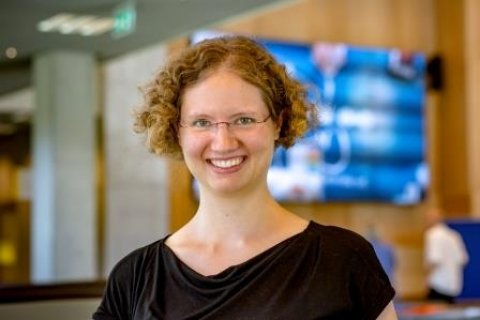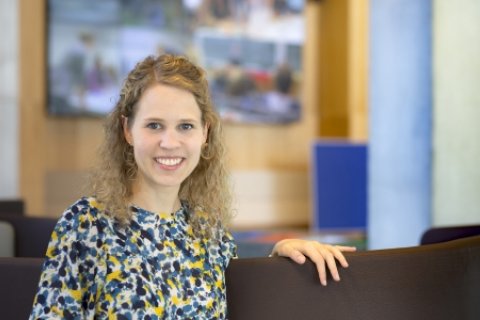"It is not about gender, but about the person." Interview with two Westerdijk Fellows at the Mathematical Institute
Om genderdiversiteit onder wetenschappelijk personeel te vergroten heeft de Universiteit Utrecht de Westerdijk Fellowship ingesteld. De faculteit Bètawetenschappen heeft onlangs twee universiteitsdocenten aangesteld als Westerdijk Fellowship : Carolin Kreisbeck and Damaris Schindler. In dit interview komen zij aan het woord over hun wiskundig onderzoek en over vrouwen in de wetenschap.
Lees het volledige interview in het Engels

Damaris Schindler conducts mathematical research in the field of number theory. Her main interests lie in the area of Diophantine equations, that is the study of polynomial equations with rational or integral coefficients. Damaris is originally from Germany, did her PhD in Bristol (UK), her postdoc in Bonn and worked at the Institute for Advanced Studies in Princeton (US).
“An interesting part of this area of research,” explains Damaris, “is that the questions are sometimes easy to ask, but finding the answers can be really complicated. Some of the research questions are very old, they have fascinated people for over 2000 years. To find answers, it sometimes requires advanced techniques or heavy machinery.”
Damaris has always been fascinated by mathematics. “I think it’s beautiful. When I was a teenager, I already knew that I wanted to spend a lot of time doing it.”
Locked up in an attic
Her colleague Carolin Kreisbeck, who works in the same building at the Mathematical Institute of the Faculty of Science, feels the same passion about the discipline. She too, is from Germany and thinks of mathematics as ‘something very special, the best discipline you can study.’ Carolin did her PhD in Regensburg (Germany), to where she returned after two one-year postdocs at Carnegie Mellon University (Pittsburgh, US) and Universidade Nova de Lisboa (Portugal).
“As a young girl, I was fascinated when I read about this mathematician - Andrew Wiles - who spent seven years locked up in his attic thinking about a problem. I thought that, if such smart people spend so much time on solving a riddle, it must be an interesting and exciting field.”
Carolin is an applied analyst, who works on problems in the calculus of variations arising from applications in materials science, like elasticity and plasticity theory. She is particularly interested in developing mathematical tools for characterizing the limit behavior of parameter-dependent energy minimization problems.
“I like the applicational aspect of my research,” says Carolin. “A deep understanding of material texture is important for the design of new high-tech materials or for making reliable prediction of material behavior. For example, if you intend to replace costly crash tests for cars with realistic simulations, having a good material model at hand is key. For a reliable model one needs to take effects at different length scales and their interactions into account. Material scientists refer to this as multiscale modeling. As modern multiscale modeling is usually based on energy minimization principles, it naturally gives rise to mathematical problems with a variational character. This is the kind of problems I am eager to find out more about.”
''For my part I had so far an overall positive experience as a woman in the mathematical community"
Unbalanced situation
Both women applied for the Westerdijk Fellowship at the Mathematical Institute from different backgrounds.
"For my part I had so far an overall positive experience as a woman in the mathematical community,'' says Damaris. ''I'm excited to work as a Westerdijk fellow, the position comes with a good balance between research, teaching and other tasks at the department. I'm looking forward to being a part of this very active community in Utrecht.''
Damaris just joined the diversity committee of the Faculty of Science. ''We certainly see an unbalanced situation between the genders," she says, ''and sometimes we do not even understand these phenomena very well. In the coming year 2017 we're celebrating the 100th anniversary of the appointment of Johanna Westerdijk, the first female professor in the Netherlands. As part of the celebrations there will be short symposia, a portrait gallery and a photo exhibition of female mathematicians, working at different places around the world and being at different points of their careers. I think it would certainly be helpful if young women have more role models. Of course I’m still at the beginning of my tenure track, and also a junior researcher, but maybe along the way I could set an example for the younger generation.”

Role models
Carolin has a slightly different perspective on this topic. “I was educated at a Catholic girls school,” she explains, “and because of the fact that there were only girls in my class, there was no distinction between ‘typical boys or girls subjects'. I only noticed that there are fewer girls interested in mathematics when I got into university. But I never felt different from men in any way.”
Consequently, the fact that her position at the Mathematical Institute is a tenure track for female researchers wasn’t the most important reason in Carolin’s choice for Utrecht University. “The fact that the fellowship is an appointment especially for women is a very positive thing. But the main reason I chose to come to Utrecht is because of the good match between me and the institute. Here, I can benefit from a very active research environment, and my research adds some new aspects to the profile of the Mathematical Modeling group. I think, this is just perfect for both parties.”
Carolin doesn’t think of herself as a role model for other female mathematicians, because she feels that this is not connected to gender. “For me personally,” she explains, ”role models can be men, just as well as women. During my scientific career I’ve had a few mentors, both male and female, who have taught me a lot and have supported me in my career. How I think of them isn’t so much about their gender, but more about them as a person, their scientific achievements, and their way of doing mathematics. Of course, it would be nice if female students see me as a role model, but it’s not specifically my intention to become one. This fellowship is in the first place a great opportunity for me as a researcher, not as a woman.”

